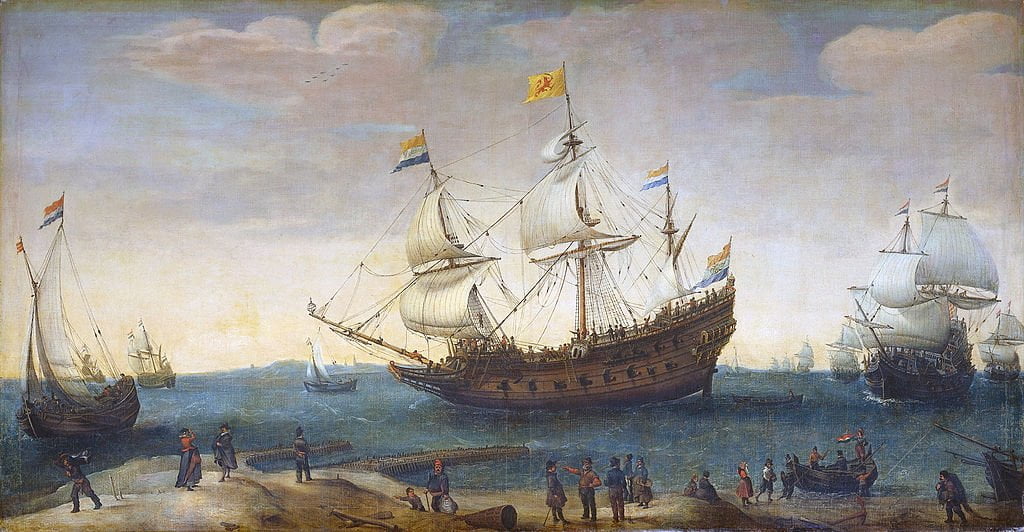Because the peoples of the Netherlands and the United States have always had the warmest of relations, contemporary American historians have typically overlooked the less than benign role that Dutch entrepreneurs played in the early development of the Virginia Colony. During the reign of Queen Elizabeth I, England and the rebelling peoples of the Low Countries were close allies. The Dutch rebels were dependent on English sea power to maintain access to the North Sea. That was to change.
Under the mismanagement of kings, James I and Charles I (1601-1652), English sea power and manufacturing capacity stagnated, while Dutch merchant ships came to dominate the waters of the northern Europe and the north Atlantic. 1 The ships of the Dutch East India Company colonized the southern tip of Africa and captured most of the Portuguese colonies in the Orient.

The English soon became jealous of being supplanted by the upstart Dutch. However, relations soured rapidly after Dutch entrepreneurs began to aggressively absorb traditional English mercantile activities. 2 With impunity, Dutch fishermen worked the English Channel and North Sea practically up to England’s beaches. During the seventeenth century, the Dutch were significant players in the African slave trade. 3 However, what is more directly related to the history of the Southern Highlands is the Dutch desire to have a complete monopoly on the international tobacco trade.
The Dutch did not create the African slave trade. It was started by Muslim traders in the 800s AD. The Muslims continued to purchase African slaves long after it was illegal in Europe. 4 In fact during 16th and 17th century. Muslim military forces and pirates enslaved over 1.25 million European Christians. The Christian slaves’ life expectancies were about the same as African slaves being hauled to the New World.
Scholars have found it almost impossible to estimate the number of slaves transported by Dutch merchant ships in the early 1600s. It appears that most of these slaves were captured from Muslim or Portuguese ships. By the late 1600s, English ships began to dominate the North Atlantic slave trade.
Ethno-centric American textbooks focus on the production of tobacco in Virginia and give the reader the impression that commercial tobacco production was an American invention. It was not. 5 In fact, Virginia was relatively late in producing a major share of the world tobacco market. However, England wanted an “in-house” source for tobacco rather than allowing the profits to flow into the Netherlands. Wherever the Dutch planted colonies in the tropics and southern temperate zones, they also planted tobacco.
Virginia attracted the interest of Dutch leaders because its tobacco was closer and therefore cheaper. The flavor of Virginia tobacco was also different than tropical tobacco. Many pipe smokers preferred it.
There is substantial circumstantial evidence, never before assembled in a single document, which suggests that the Dutch West India Company covertly played a major role in Virginia’s Seventeenth Century Indian massacres. That evidence follows in the chronology of Virginia history.
Dutch merchant ships and town leaders played a pivotal role in moving Spanish and Portuguese Sephardic Jews to regions where they did not have to fear the Inquisition. 6 The Sephardic Jews generally first went from Spain to Portugal in 1492 and then fled Portugal when the Inquisition was established in Portugal in 1586. 7 Spain annexed Portugal in 1580. Jews fleeing Portugal either immigrated to France and pretended to be French Huguenots or sailed directly to the Netherlands. Initially, some Dutch cities did not accept Jewish immigrants, but Amsterdam did. As a result, Amsterdam’s economy and populations exploded. Many Sephardic Jewish families became pioneer colonists in Dutch Brazil. When the Portuguese captured Dutch Brazil, the Sephardim relocated to North America.
Citations:
- Boxer, C.R. (1965), The Dutch Seaborne Empire 1600-1800, 1965, Oxford: Clarendon Press.[
]
- Kennedy, Paul M., The Rise and Fall of British Sea Mastery, New York: Scribner, 1978; p. 48.[
]
- Emmer, P. C., The Dutch Slave Trade 1500-1850, Oxford University Press, Berghahn Press, 2006.[
]
- Lewis, Bernard, Race and Slavery in the Middle East, Oxford University Press, 1994.[
]
- Burns, Eric, The Smoke of the Gods: A Social History of Tobacco. Philadelphia: Temple University Press, 2007.[
]
- Israel, J.I., Dutch primacy in world trade, 1585-1740, Oxford University Press, 1989.[
]
- Bodian, Miriam, Hebrews of the Portuguese Nation: Conversos and Community in Early Modern Amsterdam: Indiana University Press 1999.[
]
